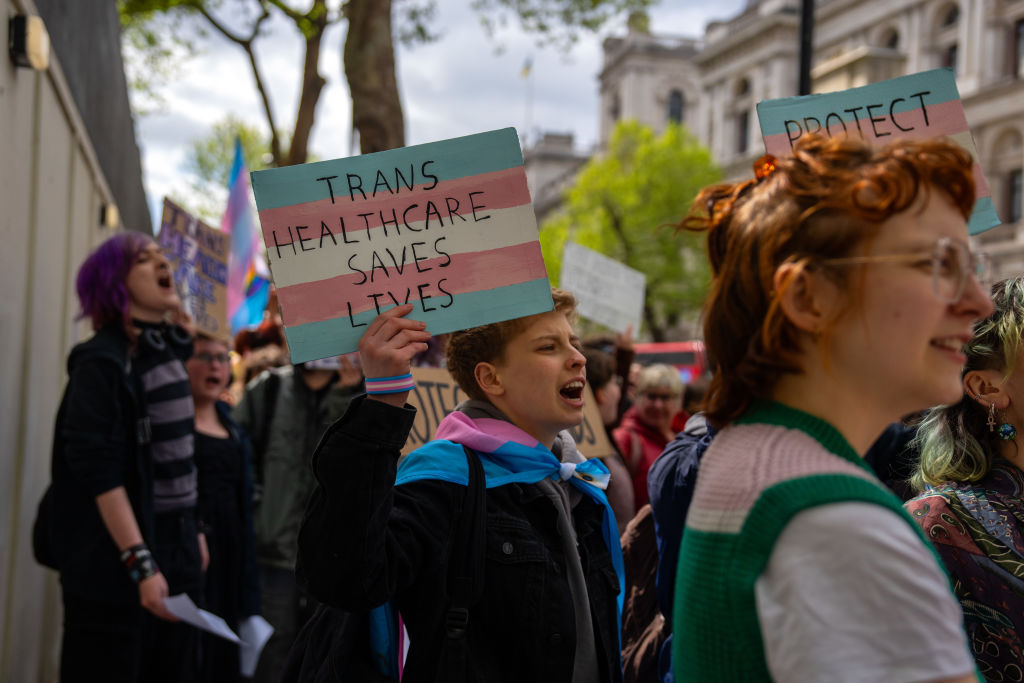Prisha has a crushed larynx from weekly testosterone injections; she cannot sing or even talk for long periods of time without feeling pain. She also describes feeling “phantom breasts” — similar to someone who has lost a limb — from her double mastectomy. Chloe will forever live with broader shoulders, wider hips, a more angular jaw and “severe atrophy” of her reproductive organs. Ritchie is completely numb in his genital area, minus the pain he feels when trying to dilate his “neovagina” or use the restroom. It typically takes ten minutes for him to empty his bladder and it almost always ends in a mess. Abel, in addition to facing similar incontinence issues to Ritchie, has random tremors on the left half of his body and saw his vision deteriorate rapidly in one eye. Some of the women will likely never have children, give birth naturally or be able to breast feed their children.
These are just some of the confessions of detransitioners — people who believed they were transgender who underwent some form of “gender-affirming care” before realizing they had made a mistake. My friend Mary Margaret Olohan, a senior reporter for the Daily Signal, tells their stories in her new book Detrans: True Stories of Escaping the Gender Ideology Cult. Mary Margaret and I have known each other for at least five years and she is one of the bravest reporters tackling social issues in America. Her book is no exception. I talked to her about what she learned from the detransitioners for this week’s edition of Culture Shock.
Beyond the likely lifelong physical consequences of a gender transition, these people also have to grapple with the psychological ramifications of knowing they can never fully go back. They grieve for the bodies they could have had if hormones and surgeries hadn’t stunted their natural growth. They struggle with feeling trapped in the decision they made when they were too young to fully understand its weight. They face vitriol from the trans community that views their detransition as a betrayal. They feel sadness and anger toward the people who allowed them to permanently alter their bodies. Rage at the medical community and media who don’t take their stories seriously.
Beautifully, though, they also talk about the peace they found when they finally accepted themselves for who they really are. “I was really actively putting energy into hating myself and my body,” Prisha said. “And not doing that is saving me and bringing me peace.”
Mary Margaret traces the origins of the gender dysphoria that presented in these detransitioners, and finds some consistent through lines: underlying mental illness, online grooming and perhaps a not super stable home life. She points out that the gender-affirming model excludes challenging a child’s self-identification, which makes it harder for a medical professional to dig into some of the underlying causes of the dysphoria. The girls in particular are often the victims of sexual abuse or some kind of unwanted male attention — sometimes compounded with discovering pornography that shows women being degraded at a young age — that made transitioning seem like an easy escape from some of the tough issues that come with going through puberty as a young woman.
“The [mental health issues] were always still there, and they were still suffering intensely. And that was what caused a lot of these people to realize, ‘Oh my gosh, I have made a huge mistake. This didn’t fix anything,’” Mary Margaret explains.
In addition to struggling to accept that they had made a mistake, she says, the detransitioners weren’t sure who to go to for help. How could they go back to the doctor that put them through this hell?
There seem to be few doctors who are willing to, let alone know how to, treat detransitioners. Chloe and Abel told Mary Margaret that when they raised their concerns about their transition to their doctors, they were told that the confusion and regret was merely a part of their “gender journey.”
“It does seem that there is a space for the doctors who care about the truth, and they care about science and medicine to step forward and say, ‘I am willing to help this person that has struggled so much. I am willing to try and help them to regain what they lost,’” Mary Margaret says. “It’s something that I have wondered many times. Where are they? Why aren’t they stepping forward? And I think that’s a space that some brave doctors could very readily fill. And I’m hoping that they will.”
Similarly, how could they tell their parents that they were a part of the emotional manipulation performed by gender activists? How would their parents be able to live with what they allowed to happen them?
“It’s a threat to the parents that if you don’t comply, your kid will be dead,” Mary Margaret says of what doctors and therapists tell the parents of children with gender dysphoria. “It’s so outrageous and manipulative and, honestly, diabolical. And it’s not true. It really is not true.”
The recent Cass Report out of the UK and investigative reporting on the WPATH files (which provides the medical standards for transgender care that many hospitals and medical associations follow in the US) indeed showed that there was not a positive correlation between gender-affirming care and mental health outcomes. England’s National Health Service prohibited the prescription of puberty blockers outside of clinical research settings.
“Thank God [the detransitioners] are willing to speak up and talk about everything that they’ve been through, because they’re a witness to the atrocities that these gender ideologists are pushing. And they and their stories, I firmly believe, are turning the tide on this horror,” Mary Margaret asserts.


















